PCI Express 6.0 - CEM Interposer

The PCIe 6.0 CEM Interposer for x16 supports data rates of 2.5 GT/s (Gen1), 5.0 GT/s (Gen2), 8.0 GT/S (Gen3), 16.0 GT/S (Gen4), 32 GT/s(Gen5), 64 GT/s(Gen6). A separate Y or straight cable must be used to connect to a Summit T54 or M5x PCIe protocol analyzer.
PCI Express 6.0 - CEM x4 Interposer
The PCIe 6.0 CEM x4 Interposer supports data rates of 2.5, 5.0, 8.0, 16.0, 32.0 and 64 GT/s and supports link widths of up to x4. New TAP6 acquisition technology from Teledyne LeCroy is making it possible for accurate capture at up to PCIe 6.0 data rates for protocol analysis. This is done by reducing signal integrity issues and enhancing fidelity capabilities for protocol transmission acquisition.
PCI Express 6.0 - CEM x8 Interposer
The PCIe 6.0 CEM x8 Interposer supports data rates of 2.5, 5.0, 8.0, 16.0, 32.0 and 64 GT/s and supports link widths of up to x8. New TAP6 acquisition technology from Teledyne LeCroy is making it possible for accurate capture at up to PCIe 6.0 data rates for protocol analysis. This is done by reducing signal integrity issues and enhancing fidelity capabilities for protocol transmission acquisition.
PCI Express 6.0 - CEM x16 Interposer with CrossSync PHY
The PCIe 6.0 CEM Interposer with CrossSync PHY support is a powerful and versatile tool for all developers working up to 64GT/s speed in their development projects.
PCI Express 6.0 - EDSFF Interposer
The PCIe 6.0 EDSFF Interposers provides connectivity and monitoring capability for E1.S, E1.L or E3.x type devices targeted at enterprise systems that use the SFF-TA-1002 multi-lane card edge connector. The interposer taps all PCIe protocol traffic between the host and EDSFF device or SSD and records it on the Summit PCIe 6.0 protocol analyzer where protocol issues and performance metrics can be further analyzed and debugged.
PCI Express 6.0 - M.2 Interposer
PCIe 6.0 M.2 Interposer enables PCIe bus traffic between a system board or tablet and an M.2 connector on a SSD device to be monitored, captured, and recorded for protocol analysis. The M.2 interposer will support analysis of PCI Express 6.0 and NVM Express (NVMe) Protocols at data rates from 2.5 GT/s up to 64.0 GT/s, and link widths of x1, x2 and x4.
PCI Express 6.0 - OCP NIC 3.0 Interposer
The PCIe 6.0 OCP NIC 3.0 Interposer allows users to connect a Teledyne LeCroy PCIe protocol analyzer between an OCP NIC 3.0 device and an OCP Server System to monitor, capture, record and analyze protocol traffic. The interposer supports data rates of 2.5 GT/s, 5.0 GT/s, 8.0 GT/s, 16.0 ,32 GT/s, 64 GT/s side band signals such as PERST#, WAKE# and SMBus (SMBCLK, SMBDAT). The PCIe 6.0 OCP NIC 3.0 Interposer supports link widths up to x16 and single/multi-hosted configurations.
PCI Express 5.0, 4.0, and 3.0 - Cable Selection Guide
PCI Express 5.0 - CEM Interposer

The PCIe 5.0 CEM Interposer for x8 support data rates of 2.5 GT/s (Gen1), 5.0 GT/s (Gen2), 8.0 GT/S (Gen3), 16.0 GT/S (Gen4), and 32 GT/s(Gen5). A separate Y or straight cable must be used to connect to a Summit T54 or M5x PCIe protocol analyzer.
PCI Express 5.0 - EDSFF Interposer
The PCIe 5.0 EDSFF Interposers provides connectivity and monitoring capability for E1.S, E1.L or E3.x type devices targeted at enterprise systems that use the SFF-TA-1002 multi-lane card edge connector. The interposer taps all PCIe protocol traffic between the host and EDSFF device or SSD and records it on the Summit PCIe 5.0 protocol analyzer where protocol issues and performance metrics can be further analyzed and debugged.
PCI Express 5.0 - M.2 Interposer
The PCIe 5.0 M.2 interposer provides connectivity and monitoring capability for M.2 connector based SSD memory modules targeted at thin client devices such as tablets. The interposer supports 30mm x 22mm, 42mm x 22mm, 60mm x 22mm, 80mm x 22mm , and 110mm x 22mm SSD lengths. This interposer optionally supports the CrossSync PHY technology enabling users to see and correlate both the physical and protocol layers in a unified time aligned view.
PCI Express 5.0 - MCIO Cable Interposer

The PCIe 5.0 MCIO Cable Interposes provides connectivity and monitoring capability for product designs that incorporate card edge connectors or cabled connector assemblies that utilize the MCIO mechanical connector based on the SFF-TA-1016 specification with PCIe 5.0, NVM Express (NVMe) or Compute Express Link (CXL) technologies. The interposer taps all PCIe protocol traffic on the MCIO cable between host and device and records it on the Summit PCIe 5.0 protocol analyzer where protocol issues and performance metrics can be further analyzed and debugged. The Interposer can provide support for 38 pin, 74 pin and 138 pin cables through up to three optional adapter kits.
PCI Express 5.0 - Multi-lead Probe
The PCIe 5.0 Teledyne LeCroy Multi-lead probes allow developers using an embedded PCI Express bus in their PCB designs to tap into the signal traces directly and capture of each serial lane, allowing flexibility to connect to any accessible points on the surface of the PCB.
PCI Express 5.0 - x16 OCP NIC 3.0 Interposer

The PCIe 5.0 OCP NIC 3.0 Interposer allows users to connect a Teledyne LeCroy T4/T5 PCIe(r) protocol analyzer between an OCP NIC 3.0 device and an OCP Server System to monitor, capture, record and analyze protocol traffic. The interposer supports data rates of 2.5 GT/s, 5.0 GT/s, 8.0 GT/s, 16.0 and 32 GT/s, side band signals such as PERST#, WAKE# and SMBus (SMBCLK, SMBDAT). The PCIe 5.0 OCP NIC 3.0 Interposer supports link widths up to x16 and single/multi-hosted configurations.
PCI Express 5.0 - U.2/U.3 Interposer
The PCIe 5.0 U.2/ U.3 (SFF-8639) Interposer is a PCIe Storage Interposer that makes it possible to analyze data traffic from PCIe SSD storage devices to PCIe Storage systems using the U.2/U.3 (SFF-8639) connector. It allows x4 NVM Express, x4SCSI Express or x2 SATA Express host interface based SSD traffic to be monitored, captured and recorded. It supports SRIS, CLCKREQ#, SMBus and Dual port mode when used with MultiPort software option. There are two types of interposer: a 6 inch and 12 inch interposer. The 12 inch model is CrossSync PHY capable.
PCI Express 4.0 - U.2/U.3 Interposer
The Gen4 U.2/ U.3 (SFF-8639) Interposer is a PCIe Storage Interposer that makes it possible to analyze data traffic from PCIe SSD storage devices to PCIe Storage systems using the U.2/U.3 (SFF-8639) connector. It allows x4 NVM Express, x4SCSI Express or x2 SATA Express host interface based SSD traffic to be monitored, captured and recorded. It supports SRIS, CLCKREQ#, SMBus and Dual port mode when used with Dual Port x2 support software option.
PCI Express 4.0, 3.0, and 2.0 - Mid-Bus Probe
A mid-bus probe is a means of connecting a protocol analyzer to an embedded PCI Express bus (e.g., a bus which runs between chips on the same circuit board). In order to use a mid-bus probe, an industry-standard connector pad is designed into the board to allow access to the bus signals. These connector pads are designed according to specifications provided by the PCI-SIG®, and an example is shown below.
PCI Express 4.0, 3.0, and 2.0 - Multi-Lead Probe
The Multi-lead Probe is a specialty probe that makes it possible to analyze PCI Express serial data traffic in an embedded data bus (e.g.., a PCI Express bus that runs between components on the same PCB). As long as the traces are exposed on the surface of the PCB, the Multi-lead Probe allows for attachment to isolation resistors soldered to the bus traces, and provides a data capture path for a Teledyne LeCroy PCI Express protocol analyzer. This eliminates the need to design any special purpose footprints or connectors into the board.
PCI Express 4.0 - x4 EDSFF Interposer
The PCIe 4.0 x4 EDSFF Interposer provides connectivity and monitoring capability for E1.S or E1.L type devices targeted at enterprise systems that use the SFF-TA-1002 multi-lane card edge connector. Four form factor types can be analyzed using this EDSFF Interposer: Both the EDSFF 1U short/narrow and EDSFF 1U short/wide form factors as defined in SFF-TA-1006 specification as well as the two 1U long version form factors as defined in the SFF-TA-1007 specification. The interposer taps all PCIe protocol traffic between the host and EDSFF device or SSD and records it on the Summit PCIe 4.0 protocol analyzer where protocol issues and performance metrics can be further analyzed and debugged.
PCI Express 4.0 - MultiPort Interposer
The PCIe 4.0 MultiPort x1, x4, x8 and x16 Interposers support data rates of 2.5 GT/s (Gen1), 5.0 GT/s (Gen2), 8.0 GT/S (Gen3), 16.0 GT/S (Gen4). A separate Y or straight cable must be used to connect to a Summit T48 or T416 PCIe protocol analyzer.
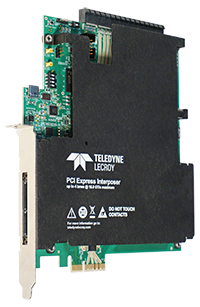
PCI Express 4.0 - x16 OCP NIC 3.0 Interposer

The PCIe 4.0 OCP NIC 3.0 Interposer allows users to connect a Teledyne LeCroy T4/T5 PCIe® protocol analyzer between an OCP NIC 3.0 device and an OCP Server System to monitor, capture, record and analyze protocol traffic. The interposer supports data rates of 2.5 GT/s, 5.0 GT/s, 8.0 GT/s and 16.0 GT/s, side band signals such as PERST#, WAKE# and SMBus (SMBCLK, SMBDAT). The PCIe 4.0 OCP NIC 3.0 Interposer supports link widths up to x16 and single/multi-hosted configurations.
PCI Express 4.0 - OCuLink Cable Interposer

Teledyne LeCroy’s PCI Express PCIe Gen4 OCuLink Cable Interposer for the Summit PCI Express Protocol Analyzer makes it easy to capture and analyze data traffic between a host and device that are connected using a PCIe OCuLink type cable based on the PCI Express OCuLink specification.
PCI Express 4.0 - M.2 Interposer
The PCIe 4.0 M.2 interposer provides connectivity and monitoring capability for M.2 connector based SSD memory modules targeted at thin client devices such as tablets. The interposer supports 30mm x 22mm, 42mm x 22mm, 60mm x 22mm, 80mm x 22mm , and 110mm x 22mm SSD lengths. This interposer optionally supports the CrossSync PHY technology enabling users to see and correlate both the physical and protocol layers in a unified time aligned view.
PCI Express 3.0 - 90 Degree Right Server Interposer

The PCIe 3.0 90 Degree Server Interposer is a specialty probe that makes it possible to analyze data traffic between an IO card in a server system board inside of a 1U/2U rackmount chassis. To use the PCIe 3.0 90 Degree Server Interposer, simply plug the IO card you want to test into the interposer, then plug the interposer into the riser card in the 1U/2U Rackmount host system. The interposer provides a number of test points and a connector to attach a Teledyne LeCroy PCI Express protocol analyzer.
PCI Express 3.0 - 90 Degree Left Server Interposer
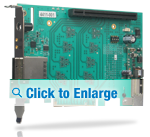
The PCIe 3.0 90 Degree Server Interposer is a specialty probe that makes it possible to analyze data traffic between an IO card in a server system board inside of a 1U/2U rackmount chassis. To use the PCIe 3.0 90 Degree Server Interposer, simply plug the IO card you want to test into the interposer, then plug the interposer into the riser card in the 1U/2U Rackmount host system. The interposer provides a number of test points and a connector to attach a Teledyne LeCroy PCI Express protocol analyzer.
PCI Express 3.0 - Mid-Bus Probe Dish Interface Board
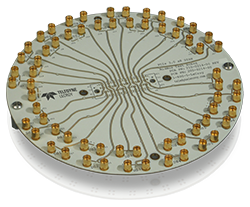
The Teledyne LeCroy PCIe 3.0 x8 Dish interface platform provides a new way for developers to attach a protocol analyzer to probe PCI Express buses during the prototype stage of board development. The dish board is a 5" (12.7 cm) diameter board constructed with Rogers 4350 low-loss dielectric, with 62 pairs of high-speed SMP connectors for signal attachment, and a full-size PCIe Mid-bus probe footprint in the center of the board.
The Teledyne LeCroy dish board provides a means for developers to introduce a mid-bus footprint in an easy, flexible and mechanically stable design. The board design provides a practical means of easily connecting a mid-bus probe to the footprint integrated into the center of the platform during early prototype development and test of new PCIe 2.0 and 3.0 designs. The board can be mechanically fixed to the DUT through the use of 2 or more of the six provided mounting holes for standoffs. The size of the standoffs can be varied to accommodate component heights on the DUT board.
Connections from the dish to the DUT are made using the high-speed SMP connectors mounted on the dish board, which allow connection to test points on the DUT using standard coaxial cables. This allows far more flexibility in connecting signals from different locations on the DUT board, or even from multiple boards and backplanes. Some examples of the flexibility provided by the dish board include connecting an analyzer in a simple chip-to-chip serial interconnect test environment (as shown below), connecting an add-in card via a standard PCIe slot, and connecting a cable or backplane assembly to test signal transmission in real application environments.

Note: The Dish Interface can be used to test Gen1, Gen2 or Gen3 PCI Express buses. However, the probe footprint incorporated into the board is the Gen3 footprint, so a Gen3 Mid-bus probe should be used to attach a protocol analyzer to the Dish Interface regardless of the data rate of the bus under test.
Key Features
-
Easily Probe PCIe® Buses
-
The dish board allows easy probing of PCI Express buses during prototype and early development of PCIe 2.0 and 3.0 designs
-
Stable Mounting Platform
-
The dish board provides a convenient and stable way to introduce a mid-bus probe footprint into a test setup
-
More Flexible Attachment
-
The dish board allows reliable connections to PCIe buses across multiple test boards
-
Optimized Signal Integrity
-
The dish board design uses Rogers 4350 to maintain optimum signal integrity across all lanes
-
Supports x8 Lane Widths
-
One dish supports x1, x2, x4 and x8 designs. Add a second for x16.
-
Supports PCIe 3.0 Data Rates
-
Supports 2.5, 5 and 8 GT/s
PCI Express 3.0 - U.2 Standard Interposer
The Standard Port 5-Inch or 12-inch PCIe 3.0 U.2 (SFF-8639) Interposer is a PCIe Storage Interposer that makes it possible to analyze data traffic from PCIe SSD storage devices to PCIe Storage systems using the U.2 (SFF-8639) connector. The interposer allows x4 NVM Express, x4SCSI Express or x2 SATA Express host interface based SSD traffic to be monitored, captured and recorded. The Interposer supports SRIS, CLCKREQ# and SMBus.
PCI Express 3.0 - U.2 Dual Port Interposer
The Dual Port -inch or 12-inch PCIe 3.0 U.2 (SFF-8639) Interposer is a PCIe Storage Interposer that makes it possible to analyze data traffic from PCIe SSD storage devices to PCIe Storage systems using the U.2 (SFF-8639) connector. The interposer when used with a dual PCI Express protocol analyzer setup allows traffic from dual port NVM Express and SCSI Express SSD drives to be monitored, captured and recorded from each port simultaneously. The Interposer supports SRIS, CLCKREQ# and SMBus.
PCI Express 3.0 - OCuLink Cable Interposer

Teledyne LeCroy’s PCI Express PCIe Gen3 OCuLink Cable Interposer for the Summit PCI Express Protocol Analyzer makes it easy to capture and analyze data traffic between a host and device that are connected using a PCIe OCuLink type cable based on the PCI Express OCuLink specification.
PCI Express 3.0 - Interposer with SMBus Support
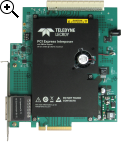
The Gen3 x4, x8 Interposers with SMBus support provide data rates of 2.5 GT/s (Gen1), 5.0 GT/s (Gen2), and 8.0 GT/S(Gen3). The interposer assures reliable data transmission while providing 100% capture of all data traffic flowing through the PCIe slot interface. Connecting the interposer to a Summit T34 Analyzer (or two T34s connected with expansion kit for x8) allows decoding and display of data (including SMBus with software license) flowing in both directions and across all lanes, and will display data traffic using the industry-standard CATC Trace™ data display, along with a range of traffic and error reports.
PCI Express 3.0 - M.2 Interposer
The M.2 interposer provides connectivity and monitoring capability for M.2 connector based SSD memory modules targeted at thin client devices such as tablets. The interposer supports 30mm x 22mm, 42mm x 22mm, 60mm x 22mm, 80mm x 22mm , and 110mm x 22mm SSD lengths.
PCI Express 3.0 - External Cable 3.0 Interposer

The PCIe External Cable 3.0 Interposer provide connectivity and monitoring capability for PCI Express External Cabling Specification Revision 3.0 based cables. This cable type is defined in the PCI Express External Cabling Specification Revision 3.0, developed by the PCI-SIG®. One cable can support link widths from x1 to x4. Larger links can be achieved by adding additional cables. For example, a x8 link uses two cables.
PCI Express 2.0 - Active Interposer

The Gen2 x8 and x16 Active Interposers support data rates of 2.5 GT/s (Gen1) and 5.0 GT/s (Gen2), and lane widths up to x16 (for the x8 interposers, the PCIe connector on the card will support PCIe expansion cards up to x16, but the lane width will be negotiated down to a maximum of x8 when passing through the interposer card). The interposers can be used with host PCIe expansion slots as small as x1 by using card edge reducer adapters.
The Gen2 x16 Active Interposer is for use with the Summit T3-16 Analyzer (or with two Summit T3-8 Analyzers). The Gen2 x8 Active Interposer is for use with the Summit T3-16, the Summit T3-8 and the Summit T28. The Gen2 x8 Active Interposer is also available in a version which supports CLKREQ# and SRIS for testing low power modes supported by these features.
PCI Express 2.0 - AMC Mezzanine Interposer

The AMC Mezzanine Card Interposer for PCIe 2.0 is a specialty probe that makes it possible to analyze data traffic from an Advanced Mezzanine Card (AMC) that uses a PCI Express interface to connect to the carrier board system. To use the AMC Interposer, simply plug the AMC card you want to test into the interposer, then plug the interposer into the host system. The interposer provides a number of test points and a connector to attach a Teledyne LeCroy PCI Express protocol analyzer.
PCI Express 2.0 - External Cable Interposer
The Teledyne LeCroy External Cable Interposer makes it easy to capture and analyze data traffic between a host and device that are connected using an external PCI Express cable by tapping into the external cable connection. The interposer is easily connected by connecting cables from the host and devices, and the interposer then provides a connection to allow an analyzer to capture and decode data traffic between the two systems. The External Cable Interposer supports PCI Express data channels with lane widths of x4 and x8 at all standard PCIe data rates up to 5 GT/s.
PCI Express 2.0 - HP Blade Server Interposer
PCI Express 2.0 and USB 2.0 - Mini Card Interposer
The Mini Card Interposer is a specialty probe that makes it possible to analyze data traffic from a Mini Card that uses a PCI Express interface to connect to a host system. To use the Mini Card Interposer, simply plug the Mini Card you want to test into the interposer, then plug the interposer into the host system. The interposer provides a number of test points and a connector to attach a Teledyne LeCroy PCI Express protocol analyzer.
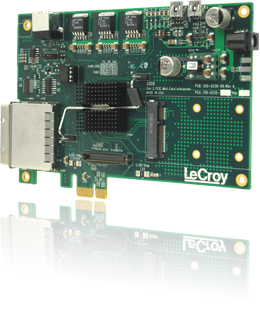
PCI Express 2.0 - Passive Interposer
The new Teledyne LeCroy Gen2 Passive Interposer provides an economical means to probe PCI Express traffic between a host and PCIe® expansion card. The interposer assures reliable data transmission while providing 100% capture of all data traffic flowing through the PCIe slot interface. Connecting the interposer to a Teledyne LeCroy analyzer allows decoding and display of data flowing in both directions and across all lanes, and will display data traffic using the industry-standard CATC Trace™ data display, along with a wide range of traffic and error reports. The Gen2 Passive Interposer supports data rates of 2.5 GT/s (Gen1) and 5.0 GT/s (Gen2), and lane widths up to x16.
PCI Express 2.0 - VPX Interposer
The Teledyne LeCroy Specialty Interposer Card for VPX Applications supports VPX developers by providing a quick and easy way to connect a Teledyne LeCroy protocol analyzer to the PCI Express data channels in the VPX interface. The protocol analyzer can then capture, decode and display all PCI Express data traffic between the VPX expansion card and the VPX backplane. The VPX Interposer Card supports PCI Express data channels with lane widths up to x8, at PCIe® 2.0 (Gen2) data rates up to 5 GT/s.
PCI Express 2.0 and 1.0 - XMC Interposer